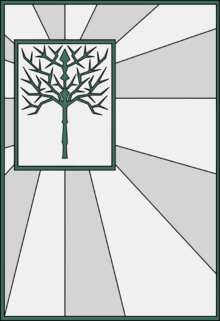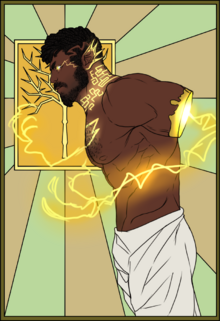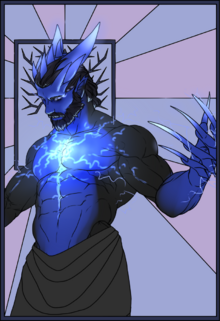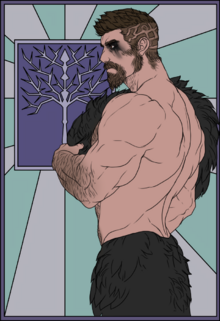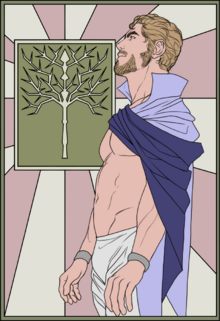Fornoss
| Fornoss | |
|---|---|
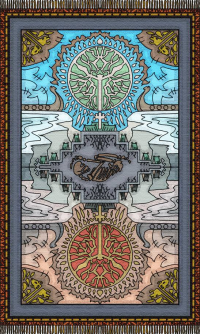 | |
| Religion | |
| Pronunciation | Old-Gods |
| Origins | Old Ceardia |
| Deities | |
| TBD | |
| Subsects | |
| TBD | |
Origins
The origins of the Old Gods religion are somewhat murky, because of intensely conflicting versions. Old Gods as a religion has always lacked an organized hierarchy, and so local communities as well as diasporas do not agree on a common origin tale. While many Regalians consider Old Gods synonymous with the Velheim culture, they actually are not, and there are more Ceardians who worship Old Gods under the Cellik variant than there are Velheim Old Gods worshipers. Old Gods reaches beyond these cultures however, with Zvorun, Tarkkin and Dunbrae all having slight variations on the same ideology. All Old Gods worshipers agree that their faith started on the island of Yervonth (called Jerl in old Velheim) however they all disagree with what happened after. Cellik and Velheim Old Gods however are the two largest denominations controlling around 80% of the total worshiper population, and as such, their version is generally accepted as common dogma. Cellik and Velheim Old Gods doctrine claims that when the menace from the west (Nelfin slavers) arrived on the shores of Ceardia, that a group of Pagan Gods created a pantheon together and spirited large communities away from the Ceardian continent, harboring them in safety on the Yervonth island. From here, Old Gods would continue to spread over the world with migration waves, however the further they went, the more their doctrine was changed by local variations and changes. Unlike Unionism, Old Gods never underwent any major cataclysmic changes or schisms. As such, this page will treat the average understanding of Old Gods as fact, though minor local variations like changing a God's name or patron identity is permissible.
Core Identity
Old Gods is a religion that developed out of the old concept of Ailor Paganism in Ceardia, which was a polytheistic religion with a theoretical infinite amount of gods. Old Gods as a religion reformed this principle, attaching itself to the tangible gods that the people could see and interact with, and then centralized religion to them. Old Gods as a religion is centered around the concepts of Honor of the Soul, which is similar to Asaredu, but not strictly bound to combat honor alone, rather to the purity of one's soul as understood through the lens of behavior, actions, and things said. Old Gods worshipers refer to the Honor of the Soul as Soldi. It is actually a common misconception to think that Old Gods worshipers refer to their own religion as Old Gods. This is incorrect, because the term Old Gods was used by Unionists to refer to the faith that was largely replaced in the Archipelago by Unionism. Old Gods is actually referred to as Sjelbyrd by Velheimers or Selbarad by Cellik Old Gods worshipers. Because Ailor kind however has so many varied cultures, and because so few of them still worship the Old Gods, the term Old Gods has simply become commonly used, even by Velheimers when they speak Common.
Tenets
- Bravery: Soldi is gained with bravery, to fight against foes that overwhelm and overpower, to seek out challenges that bring glory and honor to one's family name, and to generally not show cowardice. Soldi is lost by showing cowardice and shirking from one's duties. One must always accept challenges, even if they could result in death or infamy. One must always commit to one's decisions.
- Wroth: Soldi is not strictly gained by being mean or violent, but rather by the idea that one should never give up or simply let things happen that one does not want to happen. Inversely, Soldi is lost by simply being meek and weak and letting events transpire without affecting them. One must never shirk from duties, or show weakness when strength and power are demanded by the public eye.
- Pleasure: The matter of chasteness versus pleasure is not really a matter that demands any Soldi satisfaction. Old Gods worshipers just don't really believe in chastity. That being said, dishonesty and deceit to one's lovers and spouse(s) results in loss of Soldi. One must always remain honest and truthful to those who one spends their life with, and afford them respect as if they are gods themselves.
- Vengeful: Soldi is gained by settling scores, Soldi is lost by letting a vendetta or nemesis simply walk all over one's self. Old Gods worshipers declare Motsaga against a person to declare them their enemy with scores to settle. The Old Gods worshipers came up with the saying "An eye for an eye". If another person is not strong enough to settle their scores, one can offer to do it for them, for Soldi's sake.
- Greed: Soldi is not specifically gained or lost while being charitable or greedy, but Old Gods as a religion generally rewards those who attain and retain the power to seize what they want and be merciful with what they have, but shows little favor on those too weak to make their own destiny. Greed over finances is however not encouraged. Old God worshipers should put little value in money, and more in possessions.
- Honest: Soldi is lost with deceit and lying, though not specifically while withholding information. Old Gods religion has a concept of "white-lies", and only punishes those who tell lies for explicit personal gain or to prevent danger to self (which they must be brave to face). White lies are acceptable if they prevent someone else from losing Soldi, or make everyone happier and easier off in the long run.
- Pride: Soldi is gained when others are aware of how great a person is, and Soldi is lost if a person is forgettable and irrelevant in the scope of history. Old Gods worshipers should endeavor to make sure their skills and talents are always known to others. One should never have paintings or statues made of one's self however. Artistic vanity is considered taboo, one can only accept such gifts made by others.
- Respect: A very important aspect of Old Gods worship is the acknowledgement of respect. While one must be proud of one's self, one must always deeply respect the skills of others, and pay homage to those who are simply better (even if they deserve a challenge here and there). One should never ever pretend like even one's enemies have no qualities or respect worthy aspects about them and one must vocalize them without spite.
- Soldi: The most important aspect of Old Gods is Soldi, which is like a currency of Honor. There is no strict numerical minimum or maximum, but being accused of being without Soldi is the worst insult to levy against an Old Gods worshiper, one that they believe condemns their soul. When someone's Soldi is lost, it is possible for relatives or friends to try and reclaim Soldi for that person by attributing their deeds to them.
- Loyalty: A very important aspect of Old Gods is loyalty, which can mean loyalty to family, to lovers, to one's overlord, one's ruler, or just the gods. Vows of loyalty are taken very seriously, and breaking one is considered a great way to lose all Soldi instantly. In the Regalian context, this usually means loyalty to the Gods, but also loyalty to one's Duke or Emperor depending on one's position.
Beliefs
- Narrative: In Old Gods beliefs, the world is one giant proving grounds for all living things (even wild animals) to prove the value of their soul and prevent loss of Soldi until they die. While all living things are born with Soldi, the effects of evil causes them to commit sins. Sins causing a loss of Soldi are a person's soul showing weakness and thus not having the right to pass into the afterlife. Old Gods dictates that while bodies are made by the gods, and Dragons create a kindling of a soul, that ultimately a soul's development, nurturing, and aging, is entirely up to the person themselves. When a person dies and their soul has enough Soldi they pass into the afterlife or the Valley of Life, which is an idealized version of life with drinking, feasting, and fun. When a person who passes into the Valley of Life also has a hero or legendary status soul through some great achievement or fame in life, they go to the Valley of Legends, which is an upgraded version of this afterlife where their every whim is satisfied. In case a soul is deemed without Soldi, they are condemned to the Mirror world, where the soul wanders for eternity on the salt-flats without color, smell or sound as penance. It is said that some souls have such evil in their hears that they escape the Mirror world, and become Undead in the real world. This is why Old Gods worshipers have such a negative view of Undead who were Old Gods worshipers in a prior life, but are apathetic to Undead from other religions.
- Canon Evil: Canon Evil in Old Gods is called Demons, which takes similar origins as Unionism, but has a more flexible interpretation. On one hand, Old Gods worshipers do acknowledge Demons from the Void, Exist, and Bintaar as evil with corrupting intentions. They refer to them as Betrayers, with one particular Demon called The Great Betrayer being the worst, which scholars believe to be the Arken of Power. Demons seduce people into doing things that ruins their Soldi with promises of power, fame and legend. On the other hand, Old Gods worshipers acknowledge the evil in mortals as a far more realistic source of bad things in life. It is said that the Gods and Dragons made a pact, with the Gods making the bodies of Ailor-kind, and the Dragons providing the breath of life, which would create a seedling of a soul. However, as life develops, the person who the soul belongs to creates the expressions, actions and feelings of the soul themselves as it grows over time, and that evil is simply the person being too weak to hold onto virtues in life and engaging in sin. As such, evil can neatly be defined as either Demons inducing weakness in otherwise strong people, or weakness just existing in a soul because the person themselves are weak.
- Identity: Old Gods dogma has no explicit gender, sex, sexual orientation or gender-identity bias, though it has an implicit male-bias. While any Old Gods worshiper will claim that all genders and sexes are equally fair in their religion, traditional male-coded masculinity takes a unique place that discolors a lot of the nuance about gender. Strong, masculine and emotionless are framed as virtues for men living by the examples of their gods, and so Old Gods society can come across as publicly egalitarian, but having hidden masculine preferences under the surface.
- Conversion: Old Gods as a religion does not require preaching or spreading through missionaries, which is usually a practice reserved for Faith of Estel and Unionism, though to say it is without violent impression is false. Among Old Gods worshipers, holy wars can rage between two distinct populations over small denominational ideals (some as ridiculous as the believed hair color of a god), but bigger conflicts arise with other religions. Old Gods worshipers in general are very intolerant to other religions mostly born out of necessity, because disloyalty to the gods (for example by converting from Old Gods to Unionism) means a complete loss of Soldi and thus a soul being condemned to the Mirror world. Old Gods worshipers have been known to force their faith at the end of a sword and axe, especially in the far north where they are in the majority. Old Gods worshipers also frequently deface religious symbols of other faiths or engage in desecration of holy sites.
- Sins & Taboo: The worst cases of sinning and taboo for Old Gods are disloyalty to god, family and one's leaders, backstabbing, betrayal, deceit for greed's sake, and refusing a challenge of honor or duel of honor and abiding by cowardice. Never does a single sin or transgression cause Soldi to be lost fully, it is more like a currency that slowly leaks away, however repeat offenses do cause eventual loss of Soldi altogether. Old Gods does not really have a central body of priests to condemn a person, but generally speaking, Old Gods communities have a very communal sense of expelling a member when they believe their Soldi to be too far gone.
Gods and Goddesses
TBD
Arne, Father of All
| Arne is a non-humanoid non-physical representation of divinity in Old Gods. In Old Gods doctrine, it is believed that before Ailorkind was born, there was Arne, the tree of Life, that stood in a world that was already alive with plant life and wild life. Old Gods doctrine never made any claims on how the world or reality actually started, but implied that other religions are valid (to a degree) because they refer to the "Old World", where-as the world in which Old Gods exists now is the "New World". Simpler put, Old Gods acknowledges other religions and beliefs that pre-date itself as legitimate within their time-frame, but claims that with the birth of Old Gods, those religions or beliefs became invalid for Ailor, and that Old Gods is the only valid truth. This does mean that Old Gods is a mostly Ailor-centric religion, though more recently Url have also started following the religion (or continued following post-symbiosis). This causes particular conflict with Unionists. While Old Gods believers claim that the Everwatcher probably is real, they consider the faith false, because it induces its followers to engage in actions that cause them to lose Soldi and be condemned to the Mirror World.
Arne stood in Old Ceardia for many centuries, until he communed with Dragons (who are not considered divine, rather just really powerful entities of legend), and developed a voice. With his voice, he spoke to fauna and flora, and with them approaching his roots, his mind expanded. With expansion came his desire to create his own life, and so with each new animal or event around Arne that he became aware of, a new god or goddess was born, creating the traditional pantheon by willing them into existence, which in turn caused them to create the Ailor Race. Arne is not worshiped however, because while he is the Tree of Life, he is seen more as a means to an end, and when all the Gods were born, he went into a lifeless slumber that created the afterlife in his dreams. As such, worshiping him is like worshiping the afterlife, which Old Gods worshipers consider strange at best. He is however occasionally still referred to as the father of all the Old Gods pantheon, and the Tree of Life remains an important symbol in Old Gods, even if Arne is nowhere near as important as the Everwatcher in Unionism and is only given lip service. Arne's physical body is believed to have perished with the destruction of Ceardia, however this didn't spell disaster, as it is believed that his spirit and dreams (and thus the afterlife) live on even without his physical form. |
Liv, Beauty of Fire
TBD
Estrid, Queen of Battle
TBD
Adal, Prince of Forgiving
| Adal is the son of Bard, and was born when Bard's anger and rage caused a thunderstorm so severe that the lightning cut two branches off the Tree of Life. Adal is always depicted as an athletic male with dreads, glowing Velheim tattoos and dismembered arms, the stumps cauterized with gold, and the arms replaced with lightning. Adal is said to be forgiving and merciful, one who is frequently found to act as enforcer of laws or police among the Gods and their petty squabbles. While Adal acts as law-keeper, his forgiving and conceding attitude means he usually ends up solving nothing because he never puts his foot down. His cut off arms replaced with lightning are sometimes an analogy for the Tree of Life's ruptured branches, but is sometimes also an analogy for Bard having cut off his arms in a rage.
Adal is the god of giving aid and help, conceding, forgiving, holding no grudges and calmness of mind, an ironic thematic contrast to his lightning powers. He is the lord over thunder and controls the great lightning storms around the world. Adal is the twin brother of Odal, who he feels eternally remorseful for. Adal is on an eternal search of Odal to try and convince him to return to the pantheon proper in harmony with the other gods, but he always ends up conceding to Odal when they do meet, and no change occurs. Adal is both a god that encourages the Old Gods worshipers to kindness, while also warning them that forgiveness (while a virtue) does not help anyone if practiced all the time. Adal's shrines are usually built high on mountains with lighting rods of copper where they can conduct the lightning down to the altar. The altar is usually filled with bottles with Celectic gas, a substance that is able to store electricity in a visual form inside the bottle for extended periods of time before seeping away. Worship to Adal isn't traditionally done on a day to day basis, but usually with a purpose. Pilgrims visit his shrine either to ask for the god's blessing and to help them forgive someone who they want to forgive but cannot. Alternatively, those who want to be forgiven also pray to him, hoping that Adal will soften the hearts of those that were wronged. Adal's cult is the Arrows of the Sky Cult, which dresses in very bright yellow robes and travels the world attempting to offer advice and moral support to those seeking repentance. |
Odal, Prince of Vengeance
| Odal is the son of Bard and the twin of Adal, born when Bard's anger and rage caused a thunderstorm so severe that the lightning cut two branches off the Tree of Life, which then fell down on the ground and crushed a family of hedgehogs. Odal is always depicted as a corrupted god with blackened skin and blue discoloration, large claw-like hands, horns, and a fractured chest from which blue lightning leaks. This is because Odal is a corrupted god who despite his allegiance with the Great Betrayer, is still seen as a god, as he still acts for the wellbeing of the Old Gods worshipers so long as they align with him. Odal is imposing and very broad, believed to be the only god capable of challenging Bard and winning in combat. How Odal became corrupted varied drastically from community to community, but it usually revolves around anger and spite at the other gods for inaction.
Odal is the god is revenge, of overcoming, of conquest, of Magic, and of indominable spirit. He is also a lord of thunder, but his control of thunder is chaotic and uncontrollable. Where his heart would have been is a hole in his chest, from which chaotic lightning erupts. Odal's presence is felt in the pyroclastic flows of volcanos, and the storms that erupt from volcanos, chaotic and uncontrollable, in contrast to Adal's controlled storms. Odal frequently clashes with Bard as Bard has expelled him from the pantheon, but Odal seeks to overcome expulsion and pariah status and force his way back in, which in traditional folklore he usually succeeds in. Odal is also believed to be the source of Magic, which is seen as both a curse and a blessing. It is a blessing by Odal's gift to the individual, but a curse because it also condemns them with a life-long struggle against the sin of weakness, Old Gods worshipers believing that Magic users are not sinful because they are Mages, but can quickly become sinful because their Magic causes their soul to be weak to their vices and cocky. Odal's shrines are, surprisingly, left intact by Old Gods worshipers, mostly because they believe Odal will also enact revenge on those who destroy his shrines, as his power allows him to call misfortune on those who have dismayed him. Worship to Odal is mostly done through the offering of hunted animal carcasses being burned on his shrine, as an offering to pray for him not to bring misery to a person's life, but also to convince him not to bless one's enemies with success in their revenge. An Old Gods worshiper who is pushed to the limits of what they can take sometimes accepts the blessings of Odal and essentially becomes a Demonically possessed avatar of vengeance. If they succeed, their Soldi is cleansed and Odal gives them vengeance, if they fail, their instantly lose all Soldi and are banished to the Mirror world, implying Odal kills them. Odal has a cult called Odal's Avengers, who full-body paint themselves like Odal and are revenge-seekers for hire, selling their martial services to those who are too weak to take revenge on their wrongdoers themselves. These cultists, including those who have surrendered to Odal's demons are called Odalv. |
Bard, King of Bears
| Bard is the first son of Arne, and was born when bears took shelter under the tree of life. Bard is always depicted as a large rugged man, covered in bear or wolf-pelts, with brown hair, plenty of facial and body hair, and black charcoal washed out around his eyes emulating the claw marks of a bear. Bard is the husband of Njal, and is often said to have a raging temper and a beastly countenance that makes him lose all semblance of humanity when he is beset by fits of rage. Bard is said to be uncontrollable by the other gods, dispensing punishment and retribution on mortals for failing in the eyes of the gods, a practice which has earned him the moniker "Guardian of the gods", because he is indeed the first into battle.
Bard is the god of battle, strength, rage, endurance, stability, power and solitude. In Old Gods lore, he roams the land seeking battle from legendary beasts and gods of other religions, but has a broken heart of loneliness that he cannot mend because he is too proud to admit his desire for companionship. It is here that Njal found him, and was the only one who could break his beastly demeanor, soothe his rage, and calm his temper when it erupted. As such, Bard and Njal are now considered spouses, and are frequently framed together as the Union of Air. Bard worship is done through prayers to his name before and after battle, or to invoke his name for strength and rage during battle. Bard's shrines are usually large stone steles with runic inscriptions surrounded by animal bones, or large stone tables with all manner of beast pelts strung over it. On this table or in front of this stele are usually bowls in which offerings of the hunt are brought in his name, which can also be a piece of cloth or hair from a slain foe, which is then ritually burned. Bard has a cult of worshiper's called Bard's Wolves, though the Ceardian branch was recently eradicated in the Carrhen War by the Regalian Empire, with the Northern variant mostly in hiding in Talahm Gall. |
Njal, Prince of Art
|
Njal is the second son of Arne, and was born when birds sang their songs among the branches of the Tree of Life. Njal is always depicted as a very handsome young man with fine and expensive linens wrapped around an otherwise seductive body, with strawberry blonde hair and minimal facial hair. Njal is also traditionally depicted with heterochromia, one light-blue eye and one light-brown eye with which it is said he always keeps an eye on Bard, who has dark brown eyes. Njal is said to be eloquent and calming, a soothing presence that mediates and forms compromise between the gods when they fight. It is said that Njal provides divine inspiration, hidden as a robed stranger giving gentle hints to steer maestros into the right direction for a masterpiece. Njal is the god of creativity, art, fertility, compromise, male beauty, and silver tongues. In Old Gods lore, he roams the land seeking the perfect piece of art whether it be a painting, statue or music, but never finding it, until he found Bard one day, and discovered that the perfect piece of art was not a thing, but the virility of man. Njal ensnared Bard with poetry, and ever since is depicted as Bard's spouse that calms his worst urges and turns him into a loving partner that transitions his anger into a desire for protection and preservation. As such, Njal is seen as a necessary deterrent of godly abuse of mortals also, and one who protects them from godly cruelty. Njal's shrines are usually mobile, meaning that they are carts or special harnesses that people have developed to strap onto themselves or move around. The idea is that Njal never sits still and must roam the land to see and experience more, and so his shrines should never stay in one place either, but rather see places. The act of worship to Njal is to say a prayer to his name, and then donate an alms or some sort of gift to an artist (even if the artist is not an Old Gods believer). This has resulted in Old Gods artists using a donation pot as a Njal shrine, and so when a Unionist tips them, they actually bring a prayer to Njal. Njal's cult is called Njal's Harps, who are known to reside in some of the major cities of Drixagh, hosting debauched feasts and parties with plenty of drinking and passionate exchanges. |
Bev, Mirror of Life
TBD
Hel, Bride of Death
TBD
Hagen, Father of Time
TBD
Tove, Daughter of Dreams
TBD
Gro, Shaper of Flesh
TBD
Jord, Forger of Metal
TBD
Frode, Carer of Nature
TBD
Toke, Lirh of Wilde
TBD
Trivia
| ||||||||||
| Accreditation | |||||
|---|---|---|---|---|---|
|
| ||||
